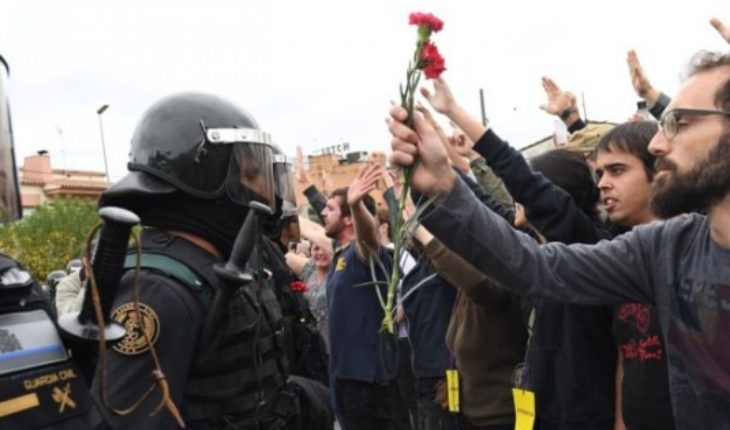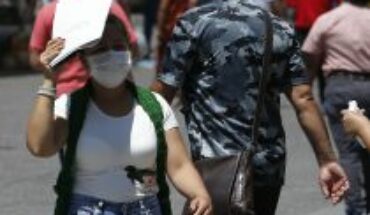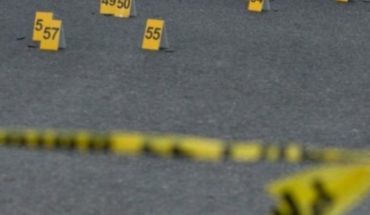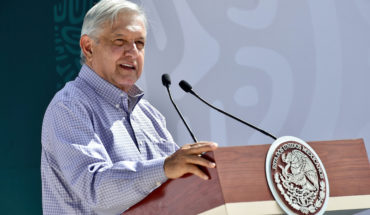in the weeks previous and post-October 1, 2017, E spaña lived a series of events that shake the political foundations of the country.
The holding of the referendum for the independence of Catalonia, which had previously been declared illegal and suspended by the Constitutional Court, marked a turning point in a process that had been brewing months and whose consequences are still being felt.
October 1, in a day of tension and violence, State security forces intervened in numerous points of voting and seized ballot boxes.
That performance generated complaints for excessive use of force. More than 800 people were served that day for medical services, according to the catalan Government.
What Miss Spain and Catalonia if separate results of the controversial inquiry – which featured a 43 percent share and on which weigh allegations of irregularities – left 90% of votes in favor of independence.
The vote – considered binding by the catalan Government – triggered effect domino that led to an ephemeral and unilateral declaration of independence, to the suspension of the autonomy of Catalonia by the Spanish Government, the cessation of the catalan Government and the new regional elections on 20 December.
A year after those days in which occurred the events, BBC World tells you what happened next and how evolved the situation of Catalonia.
1. what really became Catalonia independent?
In the light of the results of the referendum, Carles Puigdemont, the then President of the Generalitat, declared the independence of Catalonia on October 10. Seconds later, suspended its effects with the intention, he said, of “dialogue”.
However, 17 days after the catalan Parliament – in the absence of agreement between the Governments of Madrid and Barcelona – approved the Declaration of independence at a meeting in which no pro-independence parties absent when considering that the vote was illegal.
Was Catalonia independent once?
That same afternoon, the Spanish Government, led by Mariano Rajoy, applied article 155 of the Constitution, which allowed him to suspend the autonomy of Catalonia.
The catalan Government was stopped and early on December 20 elections were called.
The Declaration of independence of Catalonia, therefore, did not consummated. Outside Spain, no country in the world recognized the Catalan Republic.
“The declarations of independence had a high degree of symbolic statements without political effects: not lowered the Spanish flag, the resources of the State are not occupied to adapt them to this new Republic…” They were symbolic statements,”says a BBC World Lluís Orriols, Professor of science policy of the Universidad Carlos III de Madrid.
2 What did mean the application of article 155 and who governs Catalonia now?
The application of article 155 of the Constitution, adopted the same on October 27th, was a measure unprecedented in Spain.
“This is an exceptional clause for defence of the Constitution and the integrity of the system also collecting other constitutions,” says Algeria Queralt, Professor of constitutional law at the University of Barcelona.
“For practical purposes, it is supposed that for a time, the State is part of the competences of the autonomous community”, add in conversation with BBC world.
Challenge yourself: how much know about Europe?
After the activation of the 155, Carles Puigdemont as President of the Generalitat and the members of his Government functions were assumed by the Government of Madrid, which closed the delegations of the catalan Government abroad and other institutions related to the independence process.
“The traumatic losing institutions generated a very significant shock for the Catalan public. But it is also true that in temporal criteria was a minimum 155 because elections are called immediately after application,”says Orriols to BBC world.
The suspension of self-government was extended until June 2, when it rose automatically after taking possession of the new catalan Government, emerged from the elections in advance of December 20.
Although at these elections the most-voted party, with 25.37%, citizens, contrary to the independence, the whole of pro-independence forces, with 47,49% of the votes and 70 members of 135, held mostly in the catalan Parliament.
The formation of the Government, however, was delayed six months.
From October 29, Carles Puigdemont and other members of his Government were in Belgium, where he had fled to not face the charges which charged them the Spanish justice.
After trying unsuccessfully to be invested President of the Generalitat so telematics, another Member of the same party, Joaquim Torra, was chosen instead.
And in June, following the withdrawal of the 155, the control of the Government passed into the hands of a new independence Government.
3 in what situation are political leaders who pushed the process of independence?
A year after October 1, Carles Puigdemont, members of his Government and other pro-independence leaders are in custody, outside Spain or on parole.
The Spanish justice accuses them of the crimes of rebellion, sedition, and embezzlement of public funds.
“Policy has failed miserably” in the crisis for the independence of Catalonia while the ex-President of the Generalitat and other pro-independence politicians fled Spain, others, like the former Oriol Junqueras, appeared before the judge and they are in custody or released on bail.
This is one of the issues raised further division and confrontation currently in Catalonia and in the Spanish policy.
Much of the independence movement sees them as exiles and political prisoners. Others are fugitives and suspects.
“The imprisonment of leaders seeking an independence that finally did not take place, created a short circuit in civilian life”, has Jordi Amat, collaborator of the newspaper La Vanguardia Barcelona and author of the book “the plot of the” irresponsible”, on the catalan sovereignty process.
“The charges attributed to the jailed prisoners, socially in Catalonia are considered mostly exaggerated. And that is perpetuating a situation of institutional abnormality,”adds.
The journey of Puigdemont Europe since his escape nearly a year ago was intense. On 25 March, the former President was arrested in Germany as a result of a European warrant requested by Spain.
The German courts dismissed the charges of rebellion and sedition and ordered his extradition for embezzling funds. On the other hand, the Spanish Supreme Court rejected delivery of the catalan politician for that crime and kept the order for his arrest in Spanish territory for rebellion and sedition.
In the coming months is expected to be open Puigdemont trial and the rest of defendants in Spain.
Today, the former catalan President – who in June filed a complaint in Brussels for prevarication against Pablo Llarena, the judge who takes his cause in Spain – is located in Belgium.
“On this issue if there are political prisoners or not, we are entering the terrain of the greys. It is clear that these politicians from September crossed the line of legality and committed acts that are likely to involve a violation of the penal code. Another issue is what precept of the penal code is used”, says Professor Orriols.
“The rebellion, I think that it is not held by any side, is that justifies having a remand. If it had been only for embezzlement or disobedience now all these prisoners would be in their homes hoping that there was a trial. Then see if they have reason or not”, adds.
4. is there a climate of social tension in Catalonia?
“There are elements that lead us to think in a tension, not in conflict, but in a tension that has to do with identity. As if there were national communities living in Catalonia, which have been closed in themselves”, considers Jordi Amat.
Would survive as an independent State?
The existence of these different ‘blocks identity’ – unionists and independence–is not new in Catalonia. However, in the last year it acquired a different form of manifest.
“A division that avoids that people normally interact has been generated: Whatsapp groups have been broken, there are dinners that already are not made, friends who do not meet, families that prohibit touching the subject…”, says Professor Queralt.
One of the most visible elements of this division are yellow ties and other symbols and messages of solidarity and protest against the imprisonment of the pro-independence politicians.
Placement and removal of these items in public places became a way of expressing the political position for or against independence.
“In recent years, although in terms of public opinion, there is a clear division on this issue, just the independence movement used the streets as a way of demonstrating their strength. And the favorable to the union with Spain, probably because they are already part of Spain and vindicate the status quo on the street is less attractive because it’s what you’ve got, simply not were expressed in street. They expressed themselves at the polls, but not in the street”, explains Orriols.
“This has changed in the last year. In recent months they have begun to reclaim the streets”, he adds.
5. you grew or diminished support for independence in Catalonia in the last year?
Over the past year, polls showed a swing in support for independence.
However, in recent months, this figure was comparing to the October of 2017.
According to the last survey conducted last July by the center of Opinion studies of the Generalitat of Catalonia, 46.7% of the Catalans supported the independence of Catalonia against 44.9% rejecting it. The number of undecided is situated in the 6.7.
In the second half of October 2017, these percentages were a 48.7, a 43.6 and a 6.5 respectively.
“In the last year in net terms I becomes difficult to find a conclusion. At times we have reached minimum, earlier this year. “Now is recovering and reaching levels similar to the of a year ago”, says Orriols.
“A priori someone could think that after the December elections and the failure of the unilateral way and not have achieved independence, a disincentive could have generated in the independence movement. My feeling is that it has not entered into crisis and I think it is due in part to the sense of grievance by the prisoners,”says political scientist.
6 What will happen in the near future?
In the coming months, several political and judicial events will mark the location of Catalonia.
The arrival to the Spanish Government of the Socialist Pedro Sánchez on June 18, after winning a motion of censure against the conservative Mariano Rajoy, led to a new relationship between the Spanish and the catalan Government. In July, their Presidents met in Madrid for the first time in six years.
However, the positions between Madrid and Barcelona are distant, above all in relation to a possible inquiry agreed for independence.
Recently, Sanchez – who governs in minority and, if it runs out the legislature, will face a general election by 2020 – proposed the holding of a “referendum for self-government”, not by self-determination.
Although these words were interpreted as an attempt to approach the Government, need to know how and when this idea will be made and, if so, how it will be received by the catalan Government.
“It will be very difficult that there is a substantial change in the coming months. What we do know is that today the President of the Spanish Government takes the problem not only as a legal problem but a political problem. And understands that resolution of the problem through vote”suggests Amat.
The outcome of the trial to independence leaders, are running, analysts also condition the Catalan politics in the coming months.
“I believe that in the end we will be condemned to understand us. But I think that a few difficult months ahead. In October or November, seems that the trials will be held and that it is possible to return to light and warm spirits in the pro-independence sector in Catalonia”, argues Queralt.
translated from Spanish: 6 questions to understand what happens in Catalonia a year after the independence referendum
October 1, 2018 |





